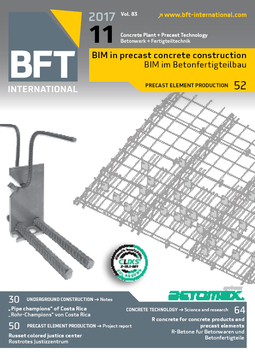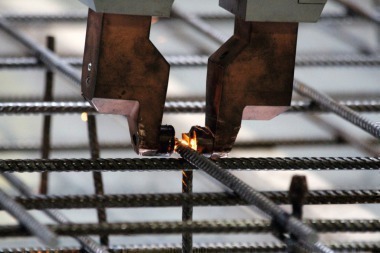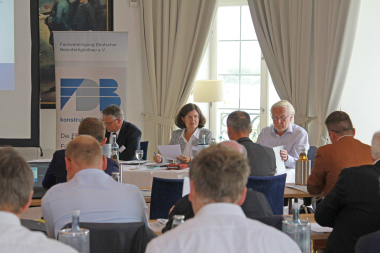Position 03/2017
BFT International, in collaboration with the German associations listed below, regularly publishes positions taken by these organizations on a current topic of interest to the German or the European precast concrete industry. This position is published concurrently in the association’s house magazine punktum.betonbauteile.
New administrative regulation and heavy transports
Large numbers of structural precast concrete elements must be transported daily from precast plants to construction sites. This usually takes place based on the just-in-time principle and in accordance with complex deadline and workflow schedules – to assure that the precast elements can be directly lifted off the trucks and erected.
Transports in excess of 40 tons and/or with dimensions of more than 26 m length, 2.50 m width or 4 m height are classified as oversize and heavy transports. For such transports, special permits are required. The transport of large and heavy precast elements has taken place for many years now. Due to dilapidated infrastructure in many places, especially on bridge structures, drivers are often forced to make considerable detours – which is expensive and ties up transport capacities as well. For transports that pass through several German federal states, a permit must be applied for and approved for every federal state; the same applies to transports that require police escort, which is also the responsibility of the individual federal states. Police escort must then be turned over to the next German federal state at every border crossed, before the driver can continue.
The already existing imponderabilities are now being made even more complicated by the new administrative ruling concerning road traffic regulation. Until now, the sector had reluctantly accepted and for better or worse coped with excessively long approval processing times for oversize transport – from two to three weeks: much too long for the construction activities. The old administrative regulation had stipulated 14 days as maximum, but this stipulation has now been deleted. Now, the new administrative regulation increases the approval period up to no less than five to six weeks. Deadline schedules will have to be recalculated and additional costs incurred as the inevitable result.
How did the new VwV-StVO regulation come into existence?
The German general administrative regulation for the Road Traffic Regulation (VwV-StVO) regulates implementation of the Road Traffic Regulation (StVO). In this context, the administrative regulations for oversize and heavy Transports (GST) are more closely defined in the section “Concerning §29 subsection 3 StVO – Excessive Road Utilization.” On 22 May 2017, the revised version of the general administrative regulation on modification of VwV-StVO was published in the German Federal Gazette. The changes followed a decision of the German Federal Government and the German Federal Council.
Changes to the general administrative regulations regarding the modifications of the VwV-StVO involve the administrative regulation of the German Federal Ministry for Transport and Digital Infrastructure. The German parliament (Bundestag) did not participate in voting.
Previously, on 06 and 07 October 2016, the Conference of Ministers of Transport under TOP 6.2 made among others the following decisions bit.ly/2gBAT4Y: The Conference demands acceleration and facilitation of the approval processes. The VMK emphasizes the significance of the approval processes for oversize and heavy transports to take place in timely manner. Moreover, the further development of VEMAGS (online processing of application and approval processes for oversize and heavy transports) must be accelerated (VEMAGS 5). In addition, the Conference of the Ministers of Transport sees in the permission of tolerances regarding wheel base spacing a possibility for facilitating the approval processes (clustering instead of regulations for “identically constructed vehicles”). The possibility of oversize and heavy-transport corridors must likewise be investigated.
The new administrative regulation resulted, at least in part, in exactly the opposite of what had been intended, in particular with regard to the duration of the approval process.
Initiative of the associations
A network of affected German industrial sectors, consisting of 23 individual associations, has already reacted and in July 2017, led by the German Federal Working Group for Heavy Transports and Crane Works, sent its demands to all 16 Ministers of Transport of the German federal states. It demands reduction of the processing time for transport approval to five working days, with a listing of measures as to how this can be accomplished. Furthermore, implementation of the VMK decisions of October 2016 regarding vehicle clustering and corridor solutions is demanded as quickly as possible (see also bit.ly/2eGkajW).
We, as associations of the precast concrete industry, unrestrictedly support these demands. Furthermore, it would be expedient to suspend for the time being implementation of a new administrative regulation for the approval of oversize and heavy transports in all federal states – or to provide other initially provisional regulations until functioning new solutions are in place at VEMAGS. We also demand that additional personnel be recruited and trained, and that investigations into clustering of vehicles and corridor solutions be completed and implemented in a new administrative regulation. In this context it would be very helpful to introduce uniform regulations on transport approvals to be valid throughout Germany.





